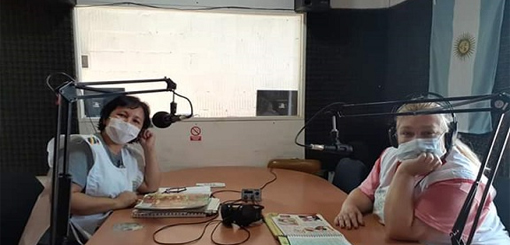A r esearch team made up of 70 people from eight national universities, two media networks, a trade union organization and a public entity will study the educational contribution made by 1,000 public and non-profit radio stations during the 2020-2021 pandemic.
esearch team made up of 70 people from eight national universities, two media networks, a trade union organization and a public entity will study the educational contribution made by 1,000 public and non-profit radio stations during the 2020-2021 pandemic.
Broadcasters analyzed include stations ran by national, provincial and municipal governments as well as those of universities, schools and native peoples' plus community, alternative and cooperative radio stations.
The research project is funded by the Ministry of Science and aims at establishing what these radios did, what are the current policies for these stations, what the audiences are like and how the schools contributed to the work of schools and teachers.
GUATEMALA
Indigenous peoples of Guatemala recently asked the Inter-American Court of Human Rights for legal recognition of community radio stations in order to be able to exercise their right to freedom of expression and cultural rights.
The IACHR Court began a two-day public hearing on a lawsuit against the State of Guatemala for alleged obstacles to the operation of four community radio stations.
The indigenous rights groups claim that there are obstacles to accessing radio frequencies and a policy of persecution against these community radio stations broadcasting operated without authorization.
Radio Ixchel was one of these stations. It was raided in 2006 with the aim of inspecting, recording and obtaining evidence of its activities. At that time their transmitting equipment was taken away and some of its workers were arrested for the crime of theft, accusations that were never confirmed, according to the lawsuit against the State.
The complaint filed before the Inter-American Court of Human Rights by the Inter-American Commission on Human Rights (IACHR) indicates that there is a lack of legal recognition of community media and an alleged maintenance of discriminatory norms regulating radio broadcasting.
NIGERIA
The Nigerian government said in recent days that it had suspended Twitter's activities, two days after the platform deleted a tweet by President Muhammadu Buhari threatening to punish separatists. Nigerian telecommunications companies have since blocked access to Twitter.
International diplomats responded with a joint statement in support of "freedom of expression and access to information as a pillar of democracy in Nigeria."
Buhari, who was Nigeria's military ruler in the 1980s, has previously been accused of stifling free speech, although his government has denied such accusations.
Twitter described his comment as "extremely troubling" and said it would work to restore access to all those in Nigeria who rely on the platform to connect and connect with the world.
The Nigeria National Broadcasting Corporation, which on shortwave operates the well-known Voice Of Nigeria, in a June 6 statement, told broadcasters "immediately suspend sponsorship of Twitter."
A few days back the Nigerian foreign minister held a closed-door meeting in the capital, Abuja, with diplomats from the United States, Britain, Canada, the European Union and Ireland to discuss the ban.
THE VATICAN
In his first visit to the Vatican Communications Department Pope Francis surprised them a few days ago with this direct question: "I have only one concern: How many listen to Vatican Radio? How many read L'Osservatore Romano?".
This is the key question on the occasion of the 160th anniversary of L'Osservatore Romano and the 90th anniversary of Vatican Radio. Although neither media discloses its audience figures, everyone knows that these numbers are very small, especially considering the costs.
With half a thousand employees, the Communication department is the largest item in the Holy See’s budget: 43 million euros per year out of a total of 310 in the current fiscal year.
The strategy of favoring state media by giving them priority in some news over the accredited media that receive them through the Press Office has not worked.
In his meeting with directors and editors, the Pope reminded them that "if your work is to reach the people, if what is done here is beautiful, big and tiring, the question you have to ask yourselves is: How many people does it reach?".
According to similarweb.com, an internet news websites ranking, abc.es occupies the global position 604, while cope.es -whose main audience is on the radio and not on the web-, is in position 4,062.
Vaticannews.va, which brings together the public media since they were merged into the Communication department, ranks 7,199 in the global ranking, while the Vatican's general information website, vatican.va, which is the worldwide reference for documents, is at 10,762.
IRELAND
This is one of the few countries that maintains long wave transmissions, one of the best bands for long-distance listening. Radio Telefis Eirean, which operates on 252 khz will carry out essential maintenance on the longwave transmitter located in Clarkstown, starting June 15, 2021 and, therefore, for two months, RTÉ Radio 1 will not be available on 252 Khz.
This work is necessary to ensure that RTÉ can continue to broadcast RTÉ Radio 1 on Long Wave.
This essential transmitter maintenance was due to be carried out in 2020, but was postponed due to Covid-19 restrictions. For the health and safety of those carrying out the works, the transmitter must be switched off during the works period, until August 14, the estimated date of completion of the works that have to be carried out during the summer months, when there are better light and weather conditions.
During this period, listeners will continue to have a wide range of options to access RTÉ's radio services that are available on the Internet, as well as FM, Internet TV, satellite and other digital platforms.






